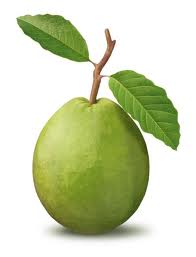 Guava, a tree which can grow to an impressive height of 25 feet, is a New World fruit with an ancient background. While the Spaniards were first introduced to this fruit in the 16th century, it is widely known that Native Americans, from Mexico to Peru, enjoyed the healing nature of this historic fruit.
Guava, a tree which can grow to an impressive height of 25 feet, is a New World fruit with an ancient background. While the Spaniards were first introduced to this fruit in the 16th century, it is widely known that Native Americans, from Mexico to Peru, enjoyed the healing nature of this historic fruit.
The guava tree contains a hard and dense trunk which is gray in color. At the top of the tree, red and yellow flowers bloom, attracting bees and birds which act to pollinate surrounding trees. When the berries are ripe, the tree is shaken and the fruits falls towards the ground, typically falling on a tarp or mesh. From here, the fruits are cleaned and sent around the world for consumption.
Key Nutrients
Guavas are an excellent source of potassium and vitamin A, vitamin C and B vitamins. Guavas are also a great source of dietary fiber and are low in both saturated and unsaturated fat.
Health Benefits
Vitamin A – Vitamin A, when converted into retinaldehyde, is a vital compound for healthy eyes. Furthermore, vitamin A is believed to fight against cataracts, macular degeneration and glaucoma. Vitamin A strengthens the membranes of the human body such as mucous membranes, respiratory, urinary and intestinal tracts. It is also essential for the lymphocytes, or white blood cells, that fight infection once in the body.
Vitamin C – Regular consumption of foods rich in vitamin C helps the body develop resistance against infections and scavenges harmful, pro-inflammatory free radicals. Vitamin C also helps to prevent respiratory problems such as asthma and lung cancer. Vitamin C has been shown to lower blood pressure, and therefore lessen the probability of hypertension.
Vitamin B1 – Thiamine is an important vitamin since it breaks down sugars in the body. Thiamine also helps to support nerve and heart health.
Vitamin B6 – Vitamin B6 helps to keep your immune system in good working order. It aids in the breakdown of fats, carbohydrates and amino acids while helping to maintain the health of lymph nodes. Additionally, vitamin B6 helps to regulate blood glucose levels.
Vitamin B9 – Folate is an important vitamin for liver function.
Vitamin B12 – Vitamin B12, or folic acid, helps to preserve neurological function and DNA synthesis. It also plays a key role in the health of red blood cells. The nervous system relies on vitamin B12 for proper function as well. Dietary Fiber – Dietary Fiber stimulates digestion and peristalsis, helping to relieve indigestion and constipation problems.
Season
Guava can be found in the supermarket from November to June.
Nutrition Information
Per 1 cup (165 grams): Calories (cKal): 112 Protein (grams): 4.21 Total Fat (grams): 1.57 Carbohydrates (grams): 23.63 Fiber (grams): 8.9
Buying and Storing
When buying guavas, make sure the fruit is free of blemishes and appears to be fresh. When storing at home, guavas should be refrigerated, where they can last up to one week.
Best Way to Add to Diet
Guavas make a great addition to any breakfast cereal, waffles or pancakes. Guavas also make a great afternoon snack serves with roasted nuts or whole wheat toast.
Guava Recipes
Guava Salad with Watermelon and Asparagus

 Not Sure What Healthy Foods To Eat?
Not Sure What Healthy Foods To Eat? This week we take a look at one of my favorite healthy foods...the mighty Avocado.
This week we take a look at one of my favorite healthy foods...the mighty Avocado.
No comments yet.